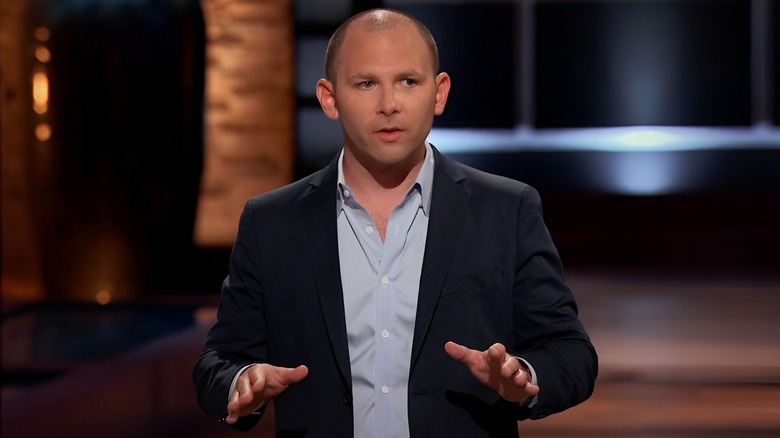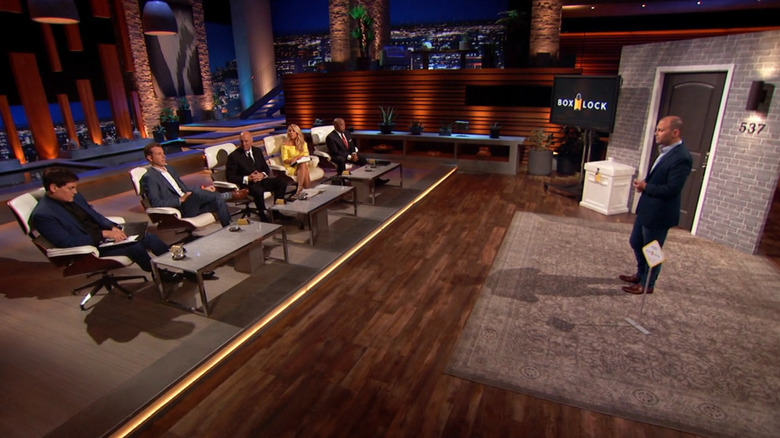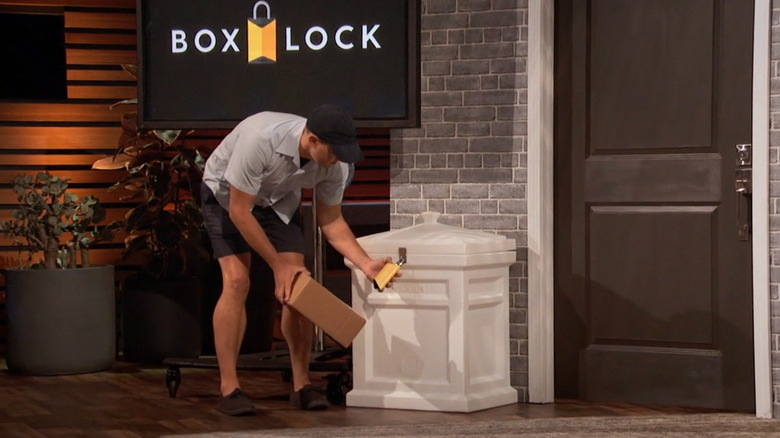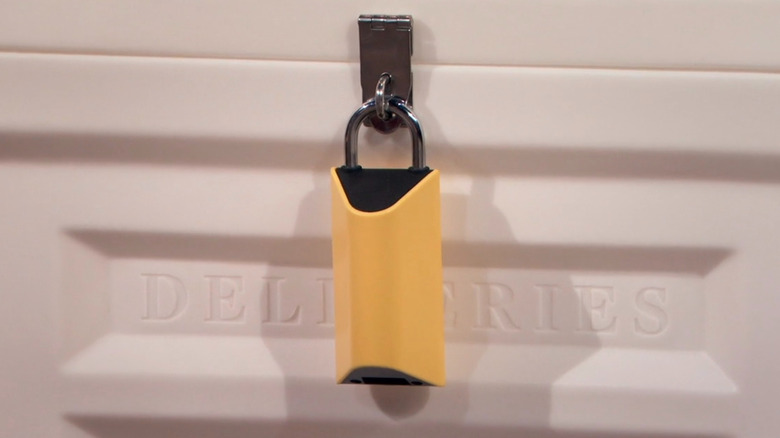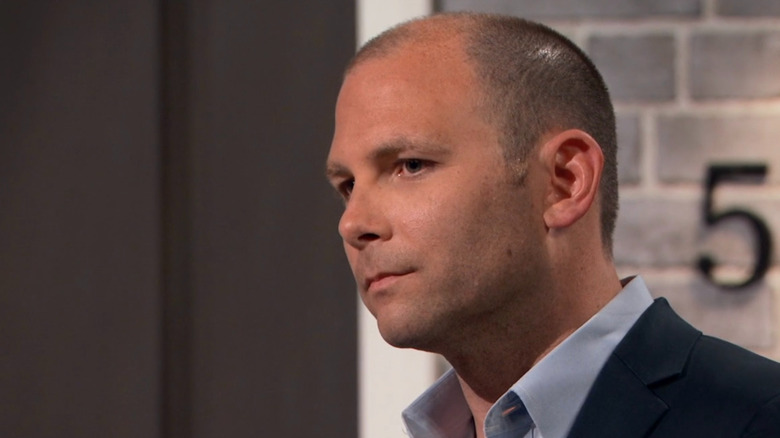Whatever Happened To BoxLock After Shark Tank?
Entrepreneur Brad Ruffkess kicked off "Shark Tank" Season 10 with what he believes to be the next step in security technology, the BoxLock. The product is a padlock that attaches to a storage container or similar locking receptacle. The BoxLock is connected to your smartphone through an app that sends out a notification once a delivery driver scans the package's bar code. After scanning the code, the BoxLock unlocks, allowing the delivery person to safely leave the box in the storage container away from any porch pirates.
Ruffkess got the motivation to create BoxLock after witnessing someone steal two packages from his porch through surveillance footage. In 2017, he launched a Kickstarter for the product with hopes of raising $20,000. The campaign ended up exceeding his expectations by a quite a wide margin, bringing in a total of $54,407 from 477 backers.
Ruffkess is no stranger to making big steps in the business world, having worked in major design and marketing positions for companies such as Coca-Cola and even hosting a TEDx Talk in 2016. But is that even enough to get him a deal on "Shark Tank?"
What happened to BoxLock on Shark Tank?
Brad Ruffkess appears on Episode 1 of "Shark Tank" Season 10 seeking a $1 million investment for 5% equity of BoxLock. Not only did the airing mark the long-running ABC series' 200th episode, but it also saw the return of Ring founder Jamie Siminoff as a guest shark, the first time a former "Shark Tank" contestant has returned on the other side of the tank. Will Siminoff's initial "Shark Tank" experience of being thrown out for a similar concept earn Ruffkess any sympathy points?
Ruffkess explains that the product is still in the manufacturing stage, although it has sold 800 units through pre-sales. Once it hits retail, it'll price out at $129 and will cost $65 per unit to produce. The team has invested roughly $500,000 into the venture so far. Ruffkess also informs the sharks that his team is working with different carriers such as USPS and FedEx on training programs for drivers.
Predictably, the sharks bring the conversation back around to the massive $20 million valuation. Ruffkess only explains that the product solves a significant problem, but fails to answer as to why the company itself is worth investing such a vast sum. The majority of the sharks exit, feeling that the proposition is too risky. Lori Greiner makes a unique offer to give the $1 million as a loan at an 8% interest rate. Additionally, she wants a royalty rate of Ruffkess' choice until she recoups $1.5 million, as well as 2.5% equity within the company. Ruffkess attempts to bring Siminoff back in on Greiner's insistence, but Siminoff refuses. Greiner goes out, leaving Ruffkess without a deal.
BoxLock after Shark Tank
BoxLock's "Shark Tank" episode aired on October 7, 2018. Even if the sharks didn't take a bite of the package protection device, the exposure helped get new eyes on BoxLock that would go on to unlock some major opportunities.
The good news began in May 2019 when it was announced that BoxLock had struck a deal to sell its products in over 5,000 Ace Hardware retail locations as well as selling online with The Home Depot. Another milestone was in store for the company when it successfully closed a significant investment round in March 2020. The funding cycle, headed by former CEOs and executives from Amazon, Microsoft, and Livingston, ended with $4.5 million raised for the business.
"We are fortunate to have such an accomplished group of industry veterans as active investors and advisors in our business," BoxLock CEO Brad Ruffkess said in a press statement. "While their financial support is critical, they understand the challenges and opportunities of ensuring secure first and last mile delivery better than anyone. Their advice and counsel will be invaluable as we enter our next phase of growth."
And grow they did. Toward the end of the year, BoxLock announced its newfound partnership with leading digital supply chain service provider SDI in an effort to offer customers more accurate and secure solutions to keeping track of their items. In May 2021, the team brought on former Kuehne + Nagel Vice President Michael Coyne as Chief Financial Officer and former Bell Creek Partners CEO Andrew Kelley as Chief Commercial Officer.
Is BoxLock still in business?
The last few years have seen BoxLock evolve in its mission. While the company remains dedicated to security efforts, it has largely moved away from serving residential areas and has focused on providing its services to other industries.
By 2022, BoxLock pivoted to becoming The Supply Chain Access Control Platform. Under this moniker, BoxLock has become a leading force in providing access and security solutions through its array of integrations, softwares, and devices. The original BoxLock is now available on a one to three year licensing plan that ranges in price from $813 to $1,292 on the company's website. A camera-integrated version of the BoxLock can also be found on the website under similar licensing agreements. Average buyers can still find the BoxLock as well as its accompanying package delivery box on Amazon.
BoxLock has gathered various clients within the construction, healthcare, and logistics industries. Some of its most notable partnerships include Caterpillar Inc., ProMedica, PPG Industries, and Ford BioMedical Laboratories.
What's next for BoxLock?
Similar to Ring, BoxLock has shaped up to be another missed opportunity for the "Shark Tank" investors. While founder Brad Ruffkess could've done a better job presenting his experience and vision for the company while on the show, he nevertheless managed to succeed in growing BoxLock far beyond what seemed possible at the time. It wouldn't be surprising to see Ruffkess appear on a "Shark Tank" update segment in the near future.
As BoxLock takes its next steps, the team's passion for aiding others through their services only grows stronger. In a 2020 interview with The Inside, Ruffkess was asked about his vision for the company's future. While he shared the exciting prospects of their recent case studies, he also recognized his tireless dedication to expanding their future collaborations. "I think there are a lot of things we're doing that we can't necessarily talk about," Ruffkess answered. "We're always looking for A, companies we can help, but B, that really need supply chain visibility and security solutions, but also those that are interested in having that story told either as a competitive benefit for them and how they're operating efficiently too."
With top-tier industry partnerships and a never-ending hunger for innovation, the road ahead for BoxLock is a bright one.
